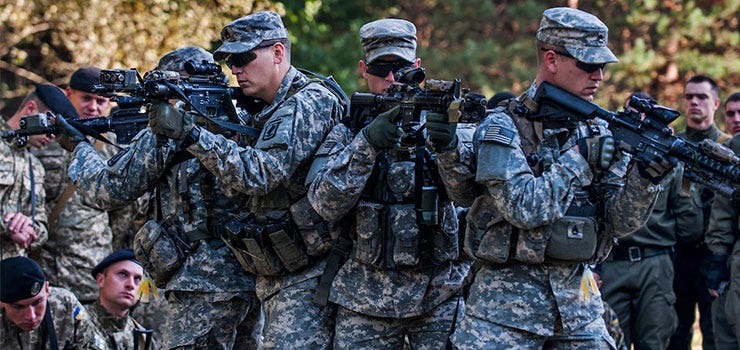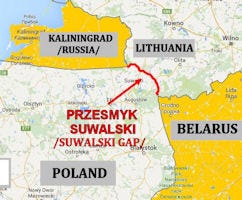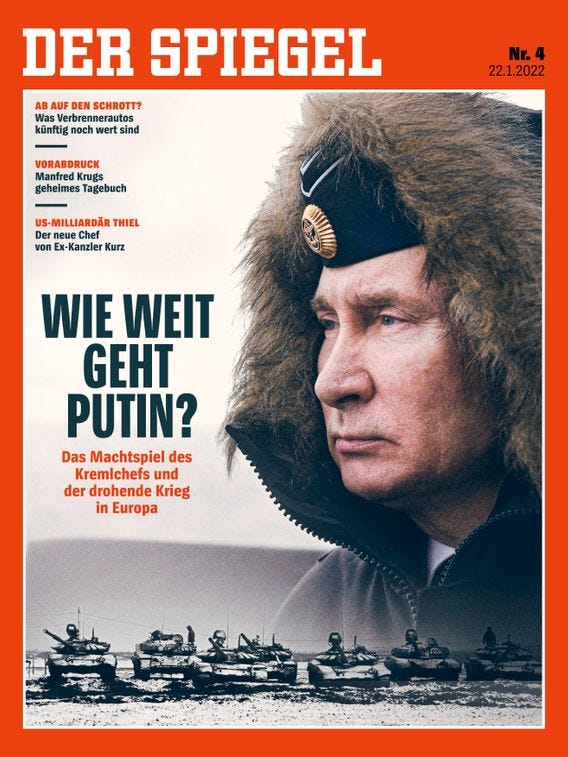The US must defend Ukraine
"We owe it to our fathers and grandfathers to safeguard what they won.” Plus: Global Eyes, nail-biter edition.
Today at the Cosmopolitan Globalist we have really a superb essay from Joshua Treviño, who argues that a Russian invasion of Ukraine is a direct challenge to the American victories in both 1945 and 1989-1991. “We owe it to our fathers and grandfathers,” he writes, “to safeguard what they won.”
The strategic verdict of 1945 was the division of Europe between two hegemons; and in 1989-1991 one of those hegemons displaced the other. For the past thirty years, the United States has been the quiet but emphatic hegemonic power across the entirety of Europe—“the New World, with all its power and might, steps forth to the rescue and the liberation of the Old” indeed!—and for the past seventy-seven years American power has kept Europe almost entirely at peace. We are so complacent and accustomed to this state of affairs that we entirely forget what a titanic achievement it is. Across three centuries, from the Sun King to the Führer, a war in Europe uniquely possessed the potential to plunge the entire world into flames. Nowhere else could do it: the Taiping might slaughter tens of millions in China, or Shaka might transform southern Africa, or the Paraguayan nation might perish in agony, and it would only attract local notice. War in Europe on the other hand was a danger for all humanity—and there was plenty of war in Europe. Europe practiced and mastered violence on a pioneering scale, until its final paroxysm of genocide and conflagration invited in the New World hegemon, to manage, lead, and suppress it in equal measure. …
READ THE ESSAY: DEFEND UKRAINE

Global Eyes
Europe
NATO Allies send more ships, jets to enhance deterrence and defence in Eastern Europe. … Biden cranks up pressure … Blinken warns of “massive consequences” . … US vows “swift, severe and united response” … US threatens use of novel export control to damage Russia’s strategic industries …
Diplomats at the United Nations are preparing for an unholy row over Ukraine.
PUTIN’S WAGER … “A large war in Europe is likely in the coming weeks. The current security architecture of the continent, the future of NATO, and America’s role in shaping security outcomes there are all at stake.”
Bank of Russia suspends purchase of foreign currency due to ruble collapse.



Spiegel: Germany has little maneuvering room in Ukraine conflict. “The US wants to impose harsh sanctions on Russia invades Ukraine. But the German government is putting on the brakes out of fears over the economic consequences and what punitive measures could mean for energy supplies for a country that gets much of its gas from Moscow.”
Senior Elysée source: “There is a kind of alarmism in Washington and London which we cannot understand. We see no immediate likelihood of Russian military action.”
Timothy Snyder: Some Ukrainian history as we contemplate Russian war.
German Navy chief quits after controversial Ukraine remarks at Delhi think tank.
Ukraine is lost. Europe is not. “Thanks to the West’s inability to think things through strategically, Russia is going to have its way in Ukraine.”
RAND: Biden’s rhetoric on Ukraine has been quite moderate. Here’s what that means.
What a “minor” Russian incursion into Ukraine may look like. “Don’t expect Russian ground forces to try to hold territory.” … “They’re so destructive”— Russian missiles could dominate Ukraine’s skies. “The United States enjoyed decades of air dominance. Not anymore.” … The day after Russia attacks. “What war in Ukraine would look like—and how America should respond.”




Why NATO survived Trump: the neglected role of Secretary-General Stoltenberg.
The election of Donald Trump posed an existential challenge to NATO. At the end of his tenure, however, the US president had neither withdrawn membership nor substantially undermined the alliance from within. This article helps explain the puzzle of why NATO survived Trump’s presidency. Extant explanations emphasize domestic factors such as the US foreign policy machinery and entrenched liberal ideology, structural reasons and Trump's idiosyncratic personality. While these accounts possess some explanatory value, they remain incomplete as they omit one central factor: NATO’s leadership. Drawing on more than twenty original interviews with senior officials, the article demonstrates that particularly Secretary-General Stoltenberg’s strategic responses were a necessary factor in changing Trump's stance on burden-sharing and helped maintain a robust deterrence policy toward Russia. These findings carry important implications both for theoretical debates on international organizations' agency in fending off contestation and policy debates on which actors shape NATO by emphasising the hitherto understated role of the secretary-general.
NATO’s Secretary General at a discussion organised by the Körber Stiftung and Der Spiegel:
Asia
China is digging Cambodia a deep-water naval base. “Satellite imagery shows Chinese dredgers working at Ream Naval Base in an expansion that could open the way for Chinese warships to dock.”
Keep reading with a 7-day free trial
Subscribe to The Cosmopolitan Globalist to keep reading this post and get 7 days of free access to the full post archives.





